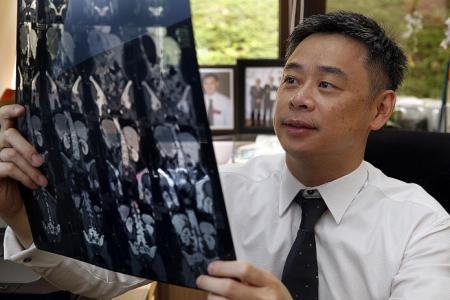Treating kidney cancer
Dr Tay Miah Hiang is a consultant medical oncologist with OncoCare Cancer Centre
Who are your patients and what do they come to see you with?
Most of my patients have cancer, but there are some who do not yet worry that they do, so they come for reassurance.
The more common cancers I see in my clinic are cancer of the colon and rectum, lung cancer, cancer of the hepatobiliary system (refers to the liver, gall bladder and bile ducts) as well as cancer of the kidney, prostate and bladder.
What do our kidneys do?
Kidneys clear urine from our system. They also help to stimulate red blood cells growth and bone growth.
What happens when one is removed?
Usually it is fine, especially when the remaining kidney function remains good. With time, the remaining kidney may even grow bigger to increase its function.
Tell us something surprising about the kidneys.
Kidneys have a higher blood flow than even the brain, liver or heart. They reabsorb and redistribute 99 per cent of the blood volume. Only 0.1 per cent of the blood filtered becomes urine.
So, how does one know if there is something wrong with the kidneys?
You should suspect that the kidneys are not functioning well when you experience symptoms such as pain while passing urine, blood in urine, pain at the loins, unexplained fatigue, weight loss or fever.
Who gets kidney cancer?
Kidney cancer is not the most common cancer but it is not rare. It is the ninth most common cancer among men.
However it can be cured using surgery if the tumour is still localised to the kidney at diagnosis. We can also treat the cancer to control its growth.
Anyone can get kidney cancer but it is more common for those above 60 years old.
We see more men with kidney cancer than women, with a ratio of two to one. People who are at higher risk include smokers, those who are overweight and those with a family history of the cancer.
What do you do to help them?
I use various medications with the ultimate aim of controlling the disease for as long as I can.
There are many effective drugs to treat kidney cancer. While chemotherapy is not effective, drugs in the class of tyrosine kinase inhibitors such as Sutent (sunitinib) can effectively control the disease by targeting the kidney cancer.
Can you give us an anecdote of a patient or some incident that profoundly inspired you?
Many patients and their care-givers inspire me.
One patient was a 78-year-old woman with advanced cancer but she fought on despite being frail.
She went on various treatments and lived for another good seven years. She had supportive sons who, despite working overseas, provided all they could for her and visited as much as they could.
Word association game. What is the first thing that comes to mind when you hear the words: Golden, growing, nuke and beans?
Popcorn.
What is the most difficult situation you have had to deal with?
When I get too close to patients and their families. For instance, one of my patients was on the last leg of his cancer journey and I knew there were no more effective treatments available to control the disease.

Dr Tay Miah Hiang is a consultant medical oncologist with OncoCare Cancer Centre - PHOTO: NUS DEVELOPMENT OFFICE
Get The New Paper on your phone with the free TNP app. Download from the Apple App Store or Google Play Store now


